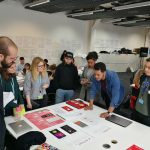Developing student and staff personas: a practical guide
If you want to be sure you're meeting the demands of your stakeholders as they use your services, creating personas to identify their needs will help sharpen your focus. As consultant Jean Mutton explains, it's a technique that's becoming more widely used and it needn't be a difficult process.
Using students to help stop students dropping out
Who better to ask about why students drop out than students themselves? Jamie Rawsthorne was in his first year at the University of West of England when he met with vice chancellor Steve West to see how he could help prevent students leaving before the end of their courses. The result was the start of his company Unique Insights. Jamie explains why and how he took on the retention challenge.
Student communications: cutting through the noise
Keeping students informed about life at university is complex but Suzanne Wigley of the University of Derby likes a challenge. She shares what they've been doing to ensure students have the information they need and also reveals what didn't quite work.
Service design for universities
Sometimes solutions are under our noses - you just need the right approach to unlock them. In this post, consultant Jean Mutton explains service design, which she says is for anyone who often thinks "there must be a better way".
Student mental health and wellbeing – why does it matter?
While universities can do much to support their students by developing policies and practices, students can also benefit from the support of charities. In this blog Grace Anderson outlines what Student Mind offers.
EDITORIAL. Never Alone: Universities’ key role in supporting students’ wellbeing and mental health
Among the many issues universities are currently concerned about, students’ mental health and wellbeing have become a core concern. According to a YouGov’s survey (2016) a quarter of our students suffer mainly of depression and anxiety, or, mostly, both combined. The need to perform, financial worries, and being in a different and new social environment can all contribute to making students feel overwhelmed at times. The IPPR study Not by Degrees (Thorley, 2017), however, paints an even more disturbing picture.
The rise of the new academic advisor
Could the advent of the TEF see the emergence of a new breed of data-empowered academic advisors? Student experience consultant Brian Hipkin says the growth in student-generated ‘teaching excellence’ metrics could herald the introduction of this role.
A model for cross-sector collaboration: how commercial activity at Ravensbourne benefits academic teams and...
The Enterprise and Innovation Centre manages the commercial activities of Ravensbourne, including industry events, short courses and live briefs for industry. In this blog Commercial Projects Manager, Ruth Nicholls, discusses what a dedicated innovation department can offer academic teams, particularly in relation to enhancing student experience.
The CATS Campaign: raising cancer awareness among students
In the second blog of our student experience series, Ellie Dunstone, a student at the University of Cambridge, shares with us the experience of the society she is involved with, the Cancer Awareness in Teenagers and young people Society, also known as CATS. Universities have a wide range of societies run by students which include sports, lifestyle choices, religion, hobbies and health. Societies can be valuable to students, learning skills which can support them in their future careers, supporting their own mental and physical health as well as others, demonstrating that there can be more to the student experience than the course.
John Lacey: ‘my perception of value for money has definitely improved’
Some 20 universities have joined forces to create a more defined path for graduates interested in a career in higher education with the Ambitious Futures programme. John Lacey, who has had placements at two universities in the north west of England, describes how these experiences have offered him new perspectives on the student journey.














